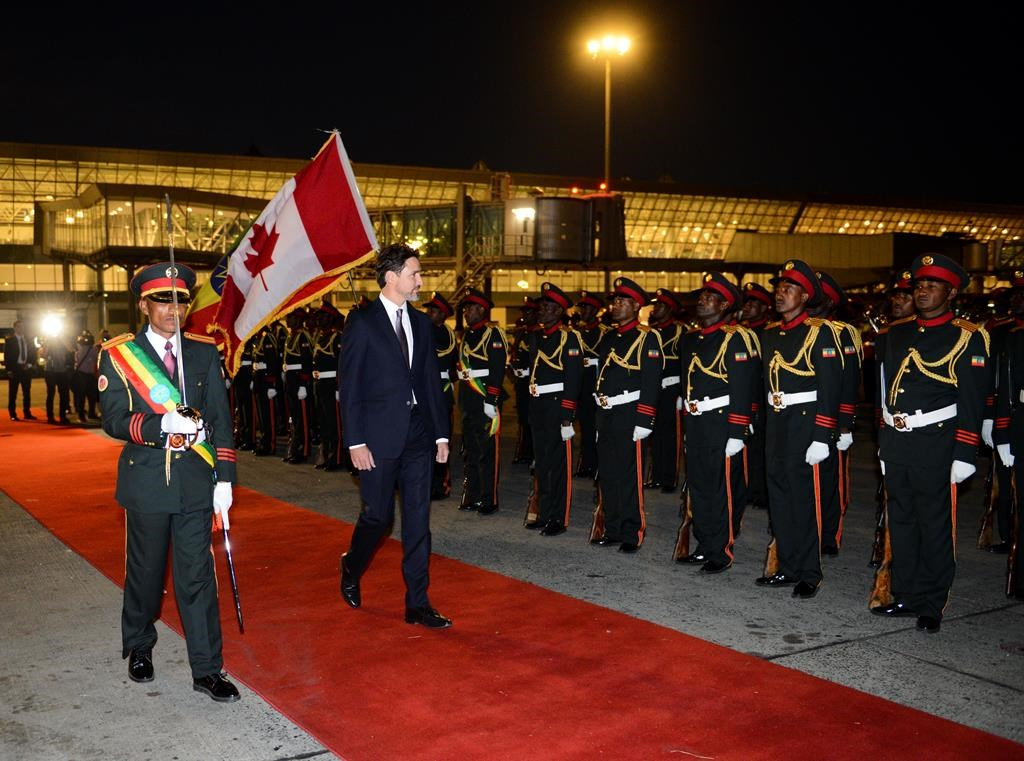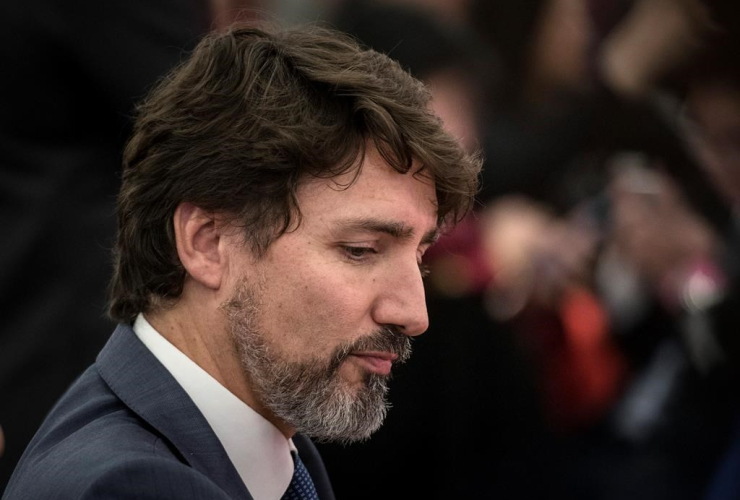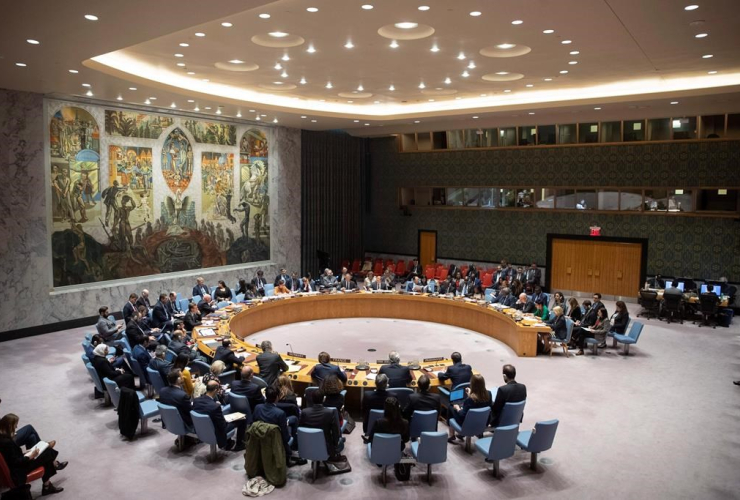Prime Minister Justin Trudeau decided to bring some star power from the sports world to his game plan in Africa this week, as he pursues support for a seat for Canada on the powerful United Nations Security Council.
Trudeau arrived in the Ethiopian capital of Addis Ababa Friday night, where he will attend a weekend session of the African Union. It's a chance for Trudeau to meet directly with several of the 54 African leaders, whose votes at the June vote at the UN will be critical to Canada's success.
He is travelling with three of his cabinet ministers but the celebrity element goes to Toronto Raptors President Masai Ujiri, who Trudeau invited to join the delegation. Ujiri was raised in Nigeria, and played professional basketball in Europe before becoming a player scout and executive in the NBA.
Ujiri, whose foundation Giants of Africa uses basketball as a means to educate and enrich the lives of African youth, was planning to travel to the continent to promote his own work, but he joined the Canadian trip after Trudeau asked him to come.
"I have relationships with leaders here and anyway we can help, anyway I can help, it's a big part of making the world better," Ujiri said.
He said he has already had several conversations with Trudeau and with Ahmed Hussen, the federal minister for families, children and social development, about how he can use his work as an ambassador for sport to help. Hussen is also on the trip.
Ujiri flew to Ethiopia with Trudeau Friday and is participating in official events with Trudeau in both Addis Ababa and later in the week in Senegal. Ujiri was among those on hand with Trudeau for his initial meet-and-greet with Ethiopian Prime Minister Abiy Ahmed Friday.
Abiy and several of Ethiopia's key cabinet ministers and diplomats met Trudeau at the airport, where an official welcome ceremony included an honour guard, a dance performance and a red carpet.
This is Trudeau's third visit to Africa as prime minister, but his first time in Ethiopia. He told Abiy in a brief conversation at the airport that he had intended to attend the African Union last year but wasn't able to. Abiy assured him this time was a better time.
The African Union is headquartered in Addis Ababa, which has become one of the biggest diplomatic cities in the world. Ethiopia is also a fast-growing economy, with per capita GDP soaring 189 per cent between 2000 and 2018. Trudeau praised Abiy's work to bring about reforms.
The theme for this year's summit is Silencing the Guns, as Africa works to reduce violence and conflict and promote economic growth and prosperity. Abiy himself just won the Nobel Peace Prize in part for his work to strike a peace deal with neighbouring Eritrea, that finally solidified a deal backed by the United Nations 20 years ago that had never been implemented.
Alice Musabende, who is completing her doctorate in international relations focusing on Africa, said for the African Union, peace and security are the biggest priority. Canada has been largely absent from those discussions, she said, while the European Union and the Americans are more involved.
"There is a lot of funding going in, there are a lot of missions," she said. "Most of the funding comes from the EU, a lot of help comes from the UN but also from the United States. The problem is Canada is nowhere to be found in these discussions."
Hussen said he feels like Canada has engaged well with Africa over the last four years. Hussen, who moved to Canada as a refugee from Somalia, said he visited the continent nine times in his previous role as immigration minister. He pointed to a number of programs to aid African immigration, particularly students from Senegal and Morocco, who want to study in Canada.
African students tend to be denied visas to study in Canada more often than those from most other countries. Hussen said the government is adding more visa application centres and introducing new services to help students, and has reduced processing times for applications in many offices.
"We attracted a record number of students from Africa," he said.
Trudeau will have an official sit down with Abiy Saturday.
Africa has 54 of the 193 total votes that will decide the Security Council's non-permanent seats in June. Canada is in the running against Norway and Ireland for two spots at the table, each lasting for two years.
Norwegian Prime Minister Erna Solberg is also set to be at the African Union meeting this weekend. Irish Taoiseach Leo Varadkar visited the continent in January, including a stop to visit Abiy in Ethiopia.
Trudeau is spending three days in Ethiopia, and will travel to Senegal and Munich, Germany before returning to Canada next week.
This report by The Canadian Press was first published Feb. 7, 2020.
Great to see Canada trying to
Great to see Canada trying to get back to an international profile that actually tries to help positive regimes in Africa and elsewhere. I worked internationally during the Harper years, and was often asked "Where did Canada go?" by people from formerly like minded countries such as Sweden, Norway, Denmark, England, France. There is tremendous value in being a middle power state that encourages good behaviour in the developing world (as opposed to nations that have imperialistic intent).
While I agree that Canada's
While I agree that Canada's foreign policy and aid program has been far better than the horrendous actions of the Conservatives, there is still a lot to criticize, including aligning Canada with the USA on many issues, such as in Latin America and refusing to create an ombudsman to monitor and evaluate Canadian corporate behavior around the world, allowing Canada's signature to the UN declaration on the rights of indigenous people to die in the Senate when it could have been approved, and Canada's all talk-no action on climate change. Just because Canada's foreign policy under the Liberals is better than under the Conservatives doesn't mean that it is good nor effective. I really question whether Canada deserves a seat on the Security Council, especially when compared to Norway and Ireland, omong others.
I wonder if Jeff Christian
I wonder if Jeff Christian can provide some examples of the so called "progressive" Liberal government encouraging good behaviour in the developing world. On the contrary I can only think of examples of Trudeau's Liberals having as he calls "imperialist intent".
Let's start with Canada interfering in Venezuela`s internal politics and supporting the ``self appointed interim president Juan Guidao`` and further imposing illegal sanctions that only serve to increase the suffering of the poorest in that country. Their actions are `solely based on supporting Canadian mining interests in that region.
They support the illegal coup and interim president in Bolivia; a country which coincidentally has a quarter of the world`s lithium deposits. Supporting and working with the far right governments in Chile, Colombia and Brazil. Brazil where Indigenous rights are disregarded and the lungs of our planet are being torched for economic gain. What about Haiti, Honduras, and Guatemala - all right wing authoritarian governments that have no respect for human rights. Canada supports these. What about selling arms to Saudi Arabia that are then used in the war against Yemen which has killed 100,000`s. Or maybe we should look right here at home where our ``progressive`` Liberal government allows the RCMP to illegally arrest indigenous Wet`suwet`en people protecting their traditional unceded land from capitalist destruction. The list goes on....
It`s quite obvious where Trudeau`s Liberals stand when it comes to ensuring peace and security in the world. They have no credibility and should not have a seat on the Security Council based on their record .
Anyone who seriously looks at Canadian foreign or domestic policy would never say that we encourage good behaviour and have no imperialist intent.
I hope that most Canadians do not agree with your comment because it is an embarrassment and illustrates ignorance on how Canadian governments in the past and the present operate, both at home and abroad, which obviously is to support ``imperialist`` and ``colonialist`` intent.





Comments